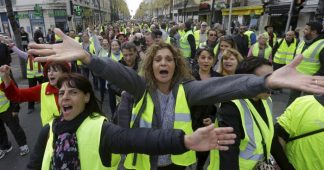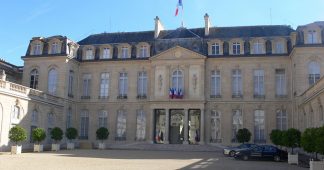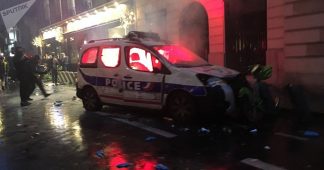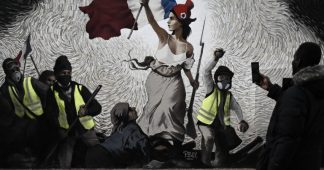By John Wight
24 Apr, 2019
The Notre Dame fire in Paris has triggered an exercise in moral cleansing by people who know the price of everything and value of nothing.
The fire destroyed a significant section of the late 12th century religious and cultural landmark, and in its wake has thrown up questions surrounding the role of religion and the value placed on cultural heritage in societies riven by class privilege and class oppression.
To put it another way, billionaires and corporate CEOs discovering their inner Jesus Christ is one of the more unedifying sights you will see, yet this is the sight we have been treated to over the sad plight to befall this internationally renowned landmark.
From the Washington Post, for example, we learn that “Even before the smoke had cleared, luxury goods magnate Francois-Henri Pinault announced his family would donate 100 million euros ($112 million) to the effort [to rebuild Notre Dame]. Not to remain on the sidelines, his rival Bernard Arnault — the chief executive of LVMH and the richest man in Europe — pledged twice that amount on Tuesday morning. The Bettencourt Meyers family, which controls L’Oreal, quickly matched that pledge. And Patrick Pouyanne, chief of executive of French oil giant Total, offered another $112 million.”
Hurling an inconvenient truth into the midst of this gushing outpouring of billionaire and corporate largesse is Philippe Martinez, head of the France’s CGT trade union. Martinez makes the point that “If they can give tens of millions to rebuild Notre Dame, then they should stop telling us there is no money to help with the social emergency.”
The social emergency he’s referring to concerns the plight of France’s economically disadvantaged – the poor, unemployed, low waged – who have been left behind at a time when President Macron, pejoratively disdained as ‘president of the rich’ by the tens of thousands of men and women who make up the Yellow Vests mass movement, continues to parade around the European and world stage. A leader so out of touch with his own people that his every word and gesture only succeeds in adding more fuel to the fire of popular discontent.
Cultural heritage is important and so is its preservation. This includes buildings of religious importance, such as Notre Dame Cathedral in Paris. Because whether our growing band of militant atheists care to acknowledge the fact or not, religion runs like an unbroken thread through human history. Even for non-believers, such as this writer, it nourishes our understanding of where we’ve been as a species, informing a sense of continuity and stability, both of which are non-negotiable factors in harnessing a semblance of social cohesion.
However, this being said, billionaires and global corporations are to the preservation of cultural heritage today what Attila the Hun was to tourism in his time. In other words, they stand as the very antithesis to such efforts. They are not and can never be part of the solution in a world in which crippling inequality and economic and social injustice has become normalised.
When we learn, for example, that half of England is owned by less than one percent of its population it is time, surely, to press reset.
When we have a situation in which more than a billion dollars is made readily available to rebuild a cathedral but nothing to rebuild broken countries, such as Syria, where countless churches and places of worship, located in some of the oldest Christian communities anywhere on the planet, were destroyed and desecrated by Salafi-jihadi hordes, it is time not only to press reset but to level a rage-filled j’accuse at Western governments, such as the French government, for their role in perpetuating the conflict with political and material support for various ‘rebel’ groups?
By the way, Jesus, changing tack for a moment, was a revolutionary – indeed a communist before the word was invented. Here, as proof, is one of the most well-known passages of the New Testament, lifted from the Gospel According to Luke:
Blessed are you who are poor, for yours is the kingdom of God.
Blessed are you that hunger now, for you shall be satisfied.
Blessed are you that weep now, for you shall laugh.
But woe to you that are rich, for you have received your consolation.
Woe to you that are full now, for you shall hunger.
Woe to you that laugh now, for you shall mourn and weep.
This is not the message of peace and love with which Christianity is universally identified, but instead class anger of a kind you would associate with Marx’s Communist Manifesto. It demystifies poverty as a natural phenomenon or divinely ordained condition of human existence, placing it squarely on the terrain of the exploitation of one class by another in the name not of freedom but profit.
When fire swept through Grenfell Tower high-rise block of flats in London in 2017, killing 72 people, the rich and corporations were nowhere to be seen. There were no fundraising telethons on behalf of the survivors and no pledging of millions within days to ensure that they were properly and suitably rehoused.
Now, what does the Notre Dame Cathedral fire in Paris have to do with the Grenfell fire in London, I hear you ask?
Well, nothing, if you believe that rich and poor connotes a judgment of moral character in favour of the former and at the expense of the latter. And nothing, too, if you do not believe that the rich in all lands speak the same language of capital accumulation and profit, regardless of the human, social or environmental cost.
Jesus, were he alive today, would be more concerned at the plight of the victims and survivors of Grenfell than the fate of a cathedral in Paris; this on the basis of prioritising the living over the dead. In France, he would be adorned in a Yellow Vest, leading the Gilets Jaunes and being gassed and showered in rubber bullets by Macron’s riot police for his trouble.
Ultimately, the controversy over the response of the rich to the Notre Dame fire highlights the difference between shadow and substance; or if you prefer, form and content. The cathedral’s status as an invaluable part of France and Christianity’s cultural heritage cannot be gainsaid. In the wake of the fire it has also proved a potent symbol of the country’s lack of social cohesion and unity.
God, in his wisdom, works in mysterious ways.
* John Wight has written for a variety of newspapers and websites, including the Independent, Morning Star, Huffington Post, Counterpunch, London Progressive Journal, and Foreign Policy Journal.











